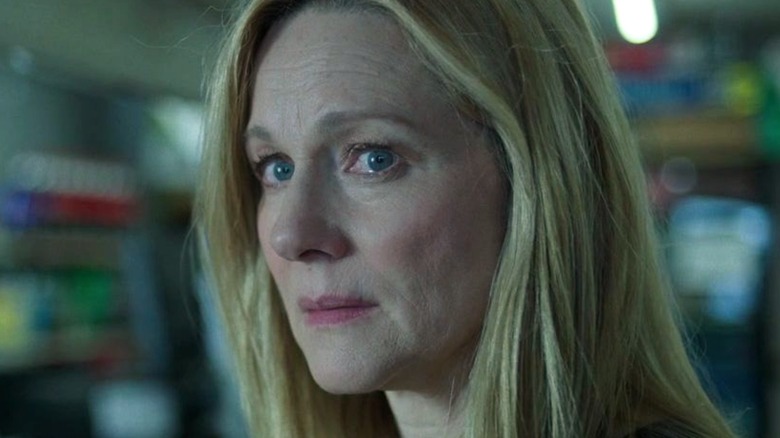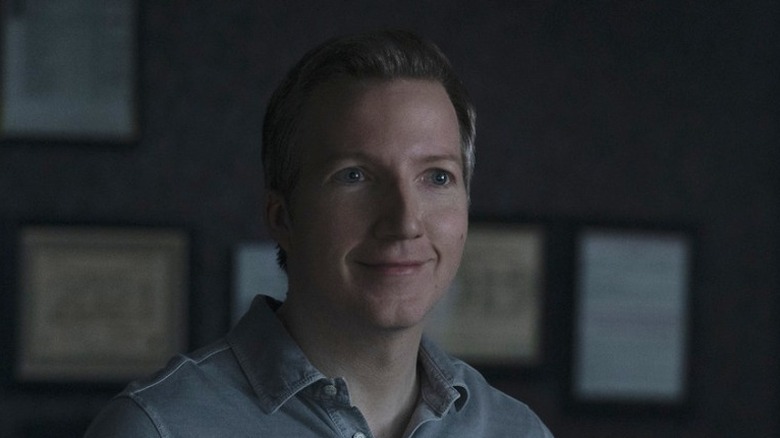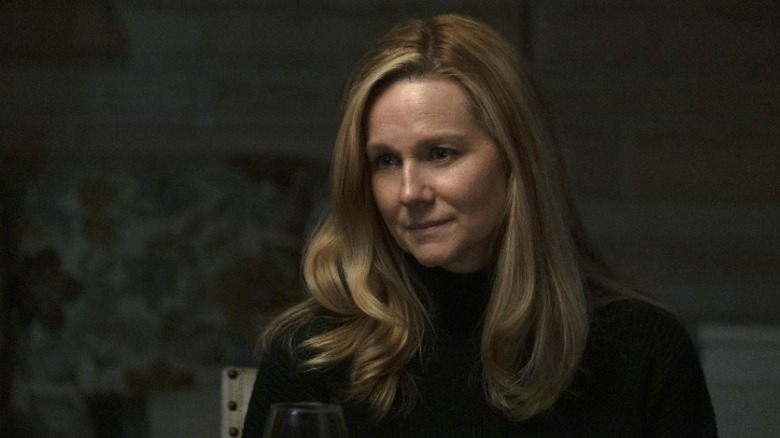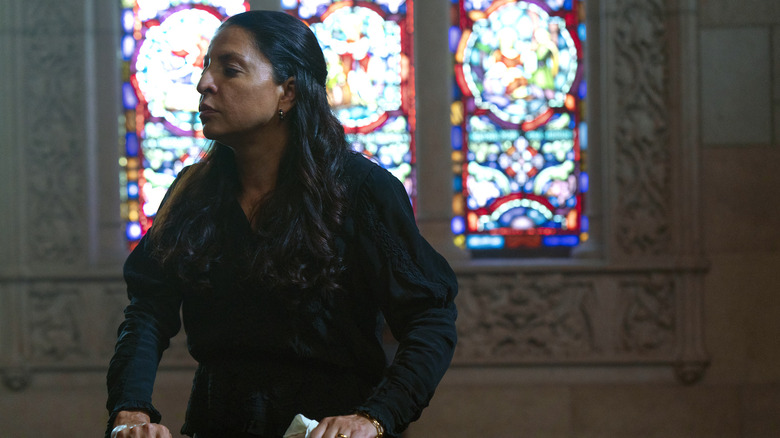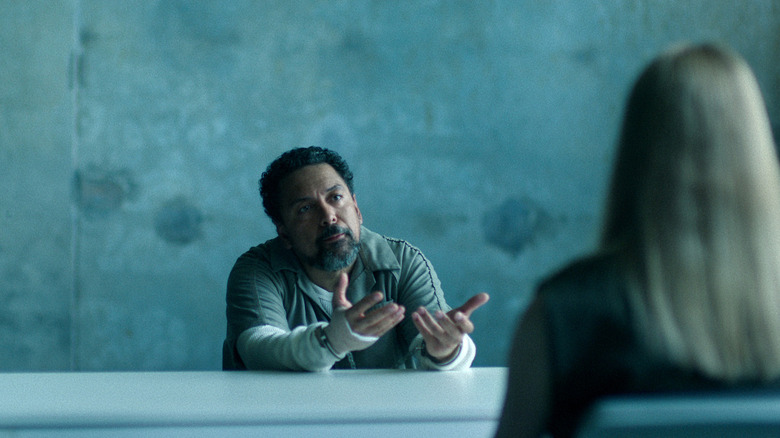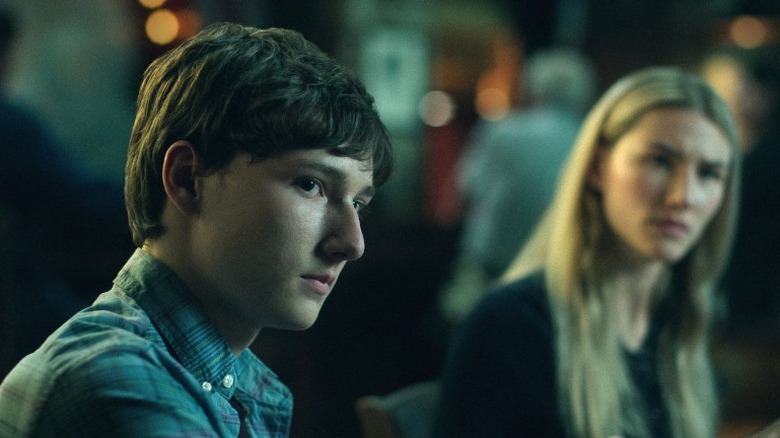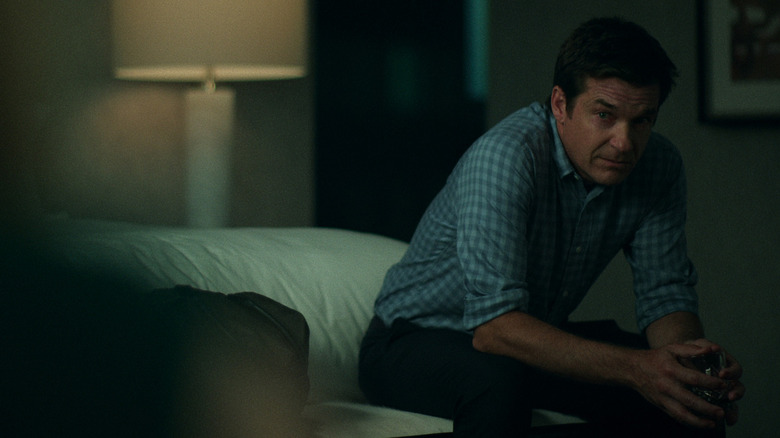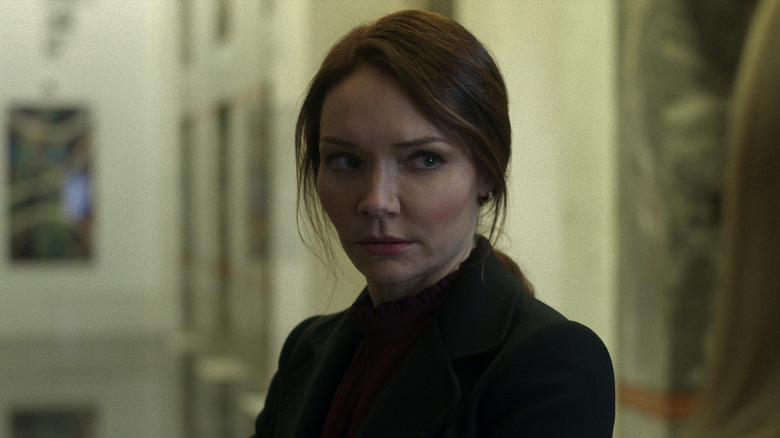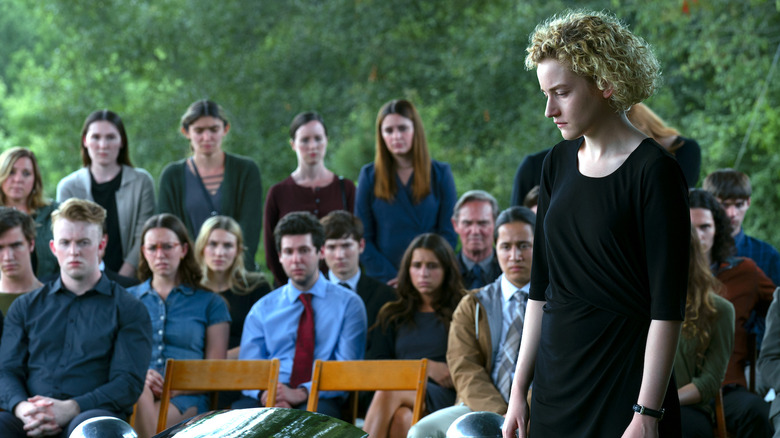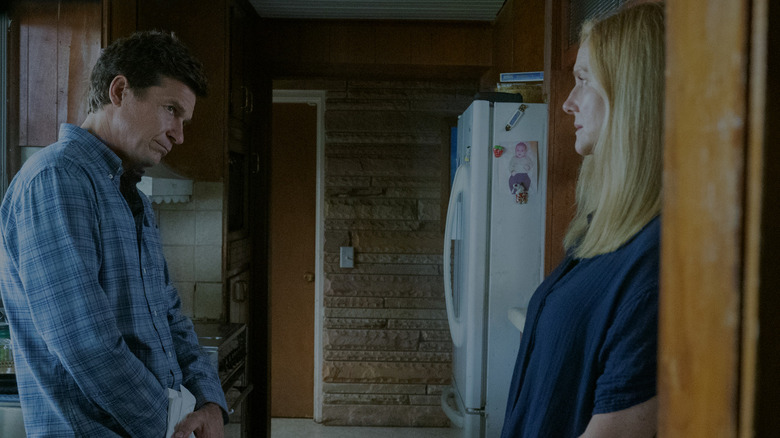The Ending Of Ozark's Series Finale Explained
No matter how much audience members enjoy living vicariously through complicated characters who swim in a pool of criminal activity, making it out alive on a show like "Ozark" isn't a foregone conclusion. In fact, "Ozark" has become an all-out roller-coaster ride that tends to end in characters paying the ultimate price. Since the crime drama series hit Netflix in 2017, fans have craved an answer to the ultimate question: Will Marty (Jason Bateman), Wendy (Laura Linney), Charlotte (Sofia Hublitz), and Jonah Byrde (Skylar Gaertner) make it out of the Missouri Ozarks alive?
Fans, rightfully so, also want to know if Ruth Langmore (Julia Garner) will go after new cartel boss Javi Elizondro (Alfonso Herrera) in the aftermath of him attacking her cousin, Wyatt (Charlie Tahan). Though all the answers to the show's biggest questions entering the final season won't necessarily be what the audience members expected, at least we can all let out a collective sigh of relief as "Ozark" has come to a triumphant conclusion. For any fans who still have questions or need certain events cleared up, here's the ending of the "Ozark" enthralling series finale explained.
Sam finally finds a purpose
While Sam Dermody (Kevin L. Johnson) might be gullible, as he pretty much does whatever the Byrdes or Ruth asks him to do without realizing he's helping them in their criminal endeavors, he still deserves a pleasant send-off. Throughout the series, he is used by the main characters as they move him wherever they need him, resulting in him working for Ruth at the Lazy-O Motel, a property she uses to launder money for Darlene.
Although he is eventually put under the churchgoers' spell when Nathan Davis (Richard Thomas) comes to the Ozarks looking for his son Ben (Tom Pelphrey), Sam escapes the Ozark madness by looking toward a higher power. Sam is then baptized and leaves town with Nathan and the congregation, meaning that he will no longer unknowingly aid and abet the main characters in their crimes. Unlike the other characters, Sam seems satisfied with his new path and bears no visible signs of trauma, which further proves how simple-minded he is. Nonetheless, at least one character appears to have a happily-ever-after at the ending of "Ozark."
Wendy's familial ties
In the final hour, Wendy makes a bold move by checking herself into a mental health facility to get her kids back. Although Ruth plays a major role in the four Byrde family members reuniting after she threatens Nathan at gunpoint in his motel room, Wendy gets the best of her father when Jonah and Charlotte leave the facility with her and Marty. Of course, Ruth decides to "help" because Marty threatens her. All the same, this event occurs after Charlotte and Jonah plan on going into Nathan's custody, giving him a victory –- albeit short-lived –- over Wendy.
Though all Wendy seemingly wants is for her family to be reunited — despite all her moves being for the betterment of the Byrde Foundation — she redeems herself by coming clean about her brother's death. At long last, she takes responsibility for his demise and apologizes to her kids, which is likely all Jonah ever wanted to hear. In the end, Nathan leaves the Ozarks with the rest of the congregation while Jonah and Charlotte stand by their parents at the Byrde Foundation gala.
Camila takes over the cartel and makes a deal with the FBI
Camila Elizondro (Veronica Falcón), Omar's sister and Javi's mother, entered the storyline as a major player in the Navarro cartel in Part 2 of Season 4 after Omar is imprisoned and Javi is murdered. After Marty spends time in Mexico to check the books and essentially run the cartel, Camila, a more natural fit as she grew up around the cartel and is part of the family, takes over Omar's daily operations while he's in prison.
Unknowingly to Omar, however, Camila makes a deal with the FBI, which grants her immunity and gifts the Byrde family their freedom. This deal was originally set up for Omar, then planned for Javi once Omar was arrested. Though Camila seems to get along with Wendy and honors the FBI's deal, allowing the Byrde family to finally go back to Chicago -– if they choose to do so in the aftermath of the series –- she shows her vengeance side by killing Ruth in the final episode.
Omar is killed to make way for Camila as the new cartel boss
Omar spends most of the final season behind bars, but he still attempts to make big demands. After he has Marty tell Camila and the cartel that he had Javi killed, Camila supposedly makes a call to have him taken out of prison, which results in Omar being hospitalized. Nevertheless, Omar heals and is finally released from jail, only to be driven to the middle of nowhere and killed by an officer. Marty, proving to be one step ahead of everyone for the entire series, eerily foreshadows Omar's death when he tells Camila that if Omar were to be killed while transferring, it would be considered fate.
With Omar officially out of the picture, the cartel is turned over to Camila. Though Omar was supposed to be released from prison, transferred to Mexico, and then broken out to head the cartel once again, the FBI's final deal is made with Camila, resulting in Omar becoming little more than a pawn in the Byrdes' eventual bid for freedom.
The Byrdes, at long last, are free from the cartel
The Byrdes have been dealing with one vicious cartel boss after another since the first episode, not to mention a plethora of other issues. They go head to head with the Kansas City mob, the Snells, and the Langmores, all while starting up the Byrde Foundation. For most of the series, audiences don't know if the family members would live or die, let alone reunite — especially Marty, as he is consistently put in harm's way. Yet, against all odds, the Byrdes made a deal with Camila and the FBI, buying their freedom from the cartel and immunity from the FBI.
Though Wendy continuously says her family is close to making all their ambitions a reality while fighting off the authorities and various criminal organizations, she is right in the end. The family is free to do whatever they want with the rest of their lives, no longer taking orders from people who could have them killed with a snap of a finger. That said, some of their operations, such as the casino, are still heavily involved with the cartel –- but before her death, Ruth owned the majority of the business.
The rip-roaring car crash didn't mean much – at least from a plot standpoint
Season 4 kicks off with the Byrdes getting in what looks like a fatal car crash. However, this scene isn't revisited until the series finale. Although it's common for fans to try to make every single detail and decision meaningful, this accident feels more like a misdirect rather than a major plot development.
The car accident, however, does indicate how much the family has been through, as it doesn't seem to phase them as much as fans might expect. Though they're initially and rightfully startled, they then hop in a cab, head home, and seemingly aren't affected one bit by the accident. They then get dressed up and go to the gala -– business as usual. However, there are some conflicting views on the accident between a couple of characters on the show. Navarro's priest (Bruno Bichir) looks at the accident as a sign of the Byrde's lives being destructive, while Wendy views the event as the last leap before they're free. The priest believes the accident was the final warning from God; Wendy believes it's an assurance that her family is going to make it out alive. For better or worse, Wendy appears to be correct.
Clare Shaw, the Byrde Foundation, and Camila celebrate their deal at the gala
For just a little while, Clare Shaw (Katrina Lenk), Camila, and the Byrdes are able to put everything aside and celebrate their deal at the Byrde Foundation gala. Clare and Camila finalize their agreement to work together. Camila becomes the head of the cartel and is free to do whatever she wants as long as she continues to cooperate with the FBI. Best of all, Marty and Wendy are free from the cartel, and the Byrde Foundation gala is a big success for good measure. The cherry on top is that Jonah and Charlotte decide to stand by their parent's side in the end.
It is a nice moment until Camila threatens Clare to give up Javi's real killer because she's suspicious and believes Clare knows what actually happened. This power play leads to Clare giving up Ruth and Camila threatening to have the Byrdes killed if they warn Ruth in any way. Needless to say, the ending of "Ozark" is bittersweet as the Byrdes are free, but one of the most beloved characters of the series meets her demise.
Camila discovers Ruth murdered Javi
Entering the series finale, it appears that Ruth just might get away with Javi's murder — right up until Clare gives her up to Camila, that is. This leads to Camila waiting at Ruth's home and, in a shocking scene, killing her with a pull of a trigger. However, Ruth stays true to herself to the end and doesn't beg for her life. She knows she has to pay the price for Javi's death and tells Camila to get it over with after she has her at gunpoint. She also tells Camila how ruthless her son was, getting one last fiery shot in.
Ruth's death leaves Three (Carson Holmes) as the sole survivor of the Langmores, though his storyline is left up in the air. Also unknown is what will happen to Ruth's portion of the casino, although it wouldn't be surprising if her stakes in the company go to Rachel Garrison (Jordana Spiro) or Three –- if they even choose to stay in the Ozarks after Ruth's death, that is. But that remains up for debate. In case viewers missed it, Ruth convinced Rachel to come back to the Missouri Ozarks to help run the casino. It was also a perfectly splendid way of bringing her back for the finale.
The Byrdes are finally caught for killing Ben
Marty and Wendy help Mel Sattem (Adam Rothenberg) get his old job on the force back, which leads to him not showing up for a hearing that could have linked Marty and Wendy to Ben's death. Later, he decides to make his way to their house in the final scene. He reveals that he finally pieced everything together as he was holding the goat cookie jar holding Ben's remains.
However, just when it seems like the Byrdes are finally going to go down for one of their countless crimes, Jonah pulls up with a shotgun. The scene ends, and the gun goes off, which was likely Jonah pulling the trigger and killing Mel. Although fan theories will likely run wild with this ending as the gun blast -– and Mel's apparent death -– aren't actually shown, it's evident that Jonah pulls the trigger and the Byrdes get off scot-free.
Of course, they'll have a lifetime of trauma to work through, given all the events they had to deal with during their time in the Ozarks. But at least they're allowed to return to their lives, right? Marty, Wendy, Charlotte, and Jonah might have limped to the finish line, but they're free to finally do whatever they want with their time left on this planet. They may have seen a myriad of deaths and endured numerous tragic moments, but any time the main characters manage to make it out of a crime drama alive, it should be viewed as a victory.
